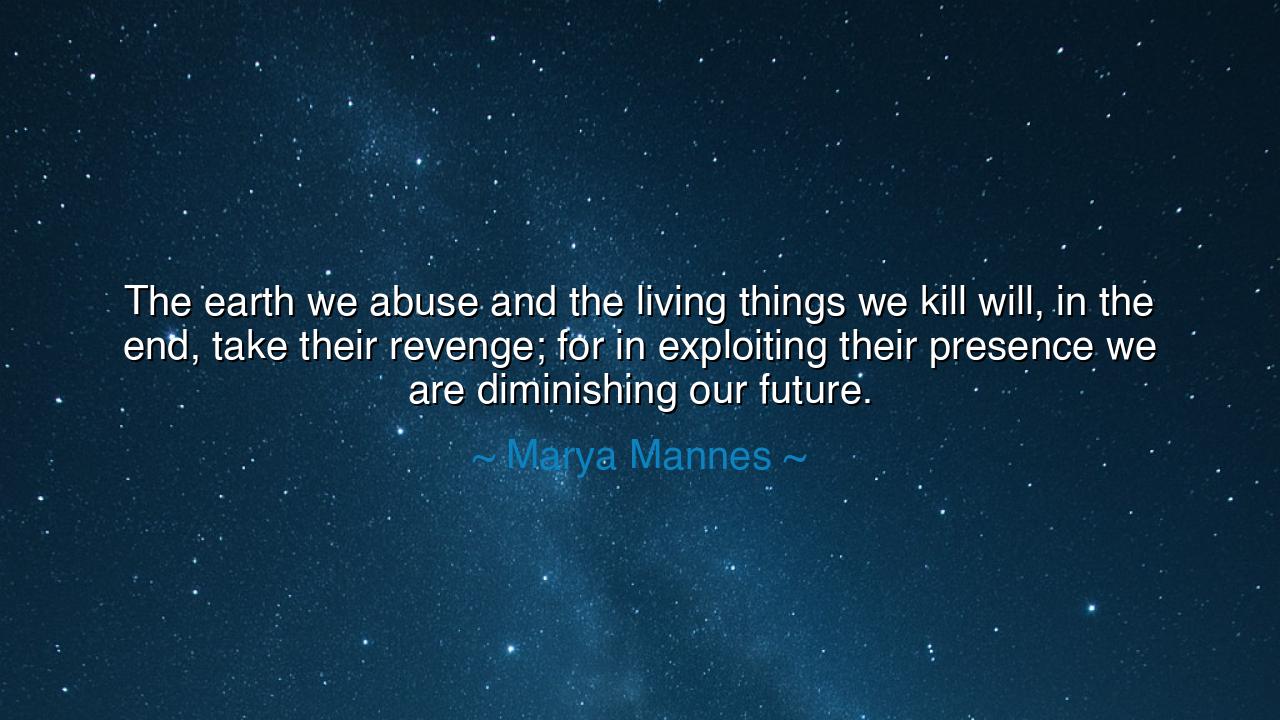
The earth we abuse and the living things we kill will, in the
The earth we abuse and the living things we kill will, in the end, take their revenge; for in exploiting their presence we are diminishing our future.






"The earth we abuse and the living things we kill will, in the end, take their revenge; for in exploiting their presence we are diminishing our future." These words from Marya Mannes serve as a profound and urgent reminder of the delicate balance between humanity and the natural world. Mannes speaks to the recklessness with which humans have treated the earth, a world that has, for eons, sustained life and nurtured civilization. The exploitation of nature's resources, without thought or care for the future, is a violation of the very contract we have with the land and its creatures. This imbalance, Mannes warns, will eventually return to haunt us, for the forces we have dismissed as inexhaustible will, in time, exact their revenge, diminishing the future not just for ourselves, but for all life on Earth.
In the ancient world, the relationship between humanity and the earth was viewed as a sacred bond. The Greeks, particularly the Philosophers, understood that the balance of nature was critical to the health and prosperity of human society. Heraclitus, the philosopher of change, famously taught that the world is in flux, but this flux must adhere to the laws of nature. To live in harmony with nature, according to Heraclitus, was to live in harmony with the universe itself. The gods, too, were seen as overseers of the natural world, demanding respect for the earth and its creatures. If humanity exploited these gifts, it was seen as a sin that would lead to ruin. Mannes’ words echo this ancient wisdom: we must tread carefully, for the earth is not something to be abused—it is something to be honored and preserved.
The story of King Midas from Greek mythology offers a tragic reminder of the consequences of exploitation. Midas, a king whose greed was boundless, was granted the ability to turn everything he touched into gold. While his newfound power seemed like a blessing at first, it quickly became his curse. Midas found himself unable to enjoy the simplest pleasures of life, as everything he touched, from food to loved ones, turned to gold. This was a direct consequence of his unchecked desire for wealth, and it mirrored the warnings of ancient philosophers—greed and the abuse of nature would only lead to destruction. Like Midas, humanity today risks turning our world into a barren, lifeless gold—beautiful, perhaps, but utterly devoid of the life and richness it once held.
Consider also the Romans, who built one of the greatest civilizations in history but fell due to overextension and the exhaustion of resources. The Roman Empire, in its height, was known for its engineering marvels and its mastery over the natural world. However, the very foundations of the empire were built on the exploitation of lands, the enslavement of peoples, and the depletion of resources. The forests of the empire were felled for timber, the land worked to its limits, and the people taxed to the point of collapse. In the end, the Roman Empire fell, not because of an outside invasion, but because of its own exploitation of the very resources that had made it great. This is a direct echo of Mannes' warning: if we continue to abuse the earth, its revenge will come, and our future will be diminished as a result.
In more recent history, the dust bowl of the 1930s serves as another stark reminder of humanity’s mismanagement of the earth. In the early 20th century, farmers in the Great Plains of the United States took to the land with great zeal, plowing and cultivating vast stretches of land without understanding the delicate balance of soil and weather. When a severe drought hit, the topsoil, which had been overworked and depleted, was swept away by the winds, creating the Dust Bowl—a catastrophe that displaced hundreds of thousands and led to the loss of fertile land for future generations. This disaster, much like the warnings of Mannes, showed the devastating consequences of exploiting nature’s resources without regard for its limits.
The lesson we must learn from these stories, ancient and modern, is that respect for the natural world is not a luxury—it is a necessity for the survival of civilization. The earth, as Mannes suggests, will not endlessly give without consequence. Exploitation is a short-term gain, but in the end, it leads to long-term loss. The health of the earth is directly tied to our own future, and if we continue to take without thought for tomorrow, we will leave a barren wasteland for our children. Sustainability and wisdom are the guiding principles we must follow if we are to avoid the mistakes of those who have come before us.
In practical terms, we must change our relationship with the earth. Conserve the resources that sustain us, not as possessions to be exploited, but as gifts to be cared for. This means investing in renewable energy, protecting our forests, rivers, and wildlife, and moving away from practices that deplete and damage our environment. We must live with humility, understanding that the earth does not belong to us—it is a gift we have inherited, and it is our duty to pass it on in better condition to future generations. Like the ancients, let us honor the earth and its creatures, recognizing that by doing so, we ensure not only the future of our world, but the happiness and prosperity of those who will come after us.






AAdministratorAdministrator
Welcome, honored guests. Please leave a comment, we will respond soon